MercoPress. South Atlantic News Agency
Tag: Henrique Meirelles
-
Sunday, May 14th 2017 - 08:53 UTC
Brazil retail sales plunge in March; government insists economy will be positive in first quarter
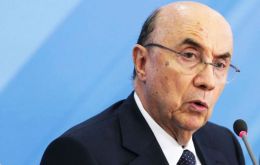
Retail sales in Brazil unexpectedly fell in March at the steepest monthly rate in 14 years, strengthening bets on a bolder interest rate cut at the end of this month. Sales volumes excluding cars and building materials fell 1.9% in March from February, government statistics agency IBGE said. Sales fell 4.0% from the year-earlier period.
-
Monday, May 8th 2017 - 21:57 UTC
Brazilian economy expected to begin takeoff in the first quarter

Brazil's economy will post growth of between 0.7% and 0.8% in the first quarter, turning the corner on a two-year recession, Finance Minister Henrique Meirelles said this week. In an interview with GloboNews cable channel, Meirelles said Brazilian companies will have to start to restock inventories and draw up investment plans.
-
Wednesday, April 19th 2017 - 14:38 UTC
Brazilian economy gives signs of recovery, but many challenges remain

Economic activity in Brazil grew in February at the fastest pace since January 2010, a central bank indicator showed this week, in the strongest sign yet that Latin America's largest economy is emerging from a two-year recession. Bumper harvests are expected to have lifted agricultural production in the first quarter of the year, while industrial output improved on a pickup in car exports.
-
Wednesday, April 19th 2017 - 14:27 UTC
Police unions storm Congress in Brasilia to protest pension reform bill

Brazilian President Michel Temer on Tuesday made new concessions to ease passage of an unpopular pension reform bill, leading police unions to try and invade Congress in the latest angry demonstration from a labor group.
-
Friday, March 17th 2017 - 22:02 UTC
Trade and protectionism in the G20 Brazil/US ministerial agenda
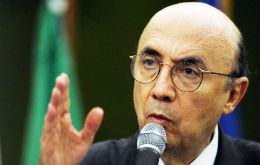
Brazil's finance minister has said that he is ready to listen to the U.S. policies on trade at this weekend's G-20 meeting but speaks from experience when he says he believes a free economy is better for everyone. “Brazil actually has experience of closing down its economy,” Henrique Meirelles said on Thursday.
-
Thursday, March 9th 2017 - 21:41 UTC
Brazil denies plans to raise taxes on forex transactions to help meet fiscal target

Brazil's central bank and finance minister denied a report that the government could raise taxes on foreign exchange transactions to help reach this year's fiscal target. Bloomberg News had reported the move was “among the options being considered” by the Brazilian government to meet its fiscal target, citing a source with direct knowledge of the issue.
-
Tuesday, January 31st 2017 - 21:03 UTC
Brazilian government is “meeting its budget deficit”, says minister Meirelles
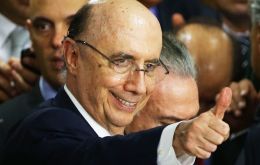
Brazil's central government registered a primary budget deficit of 154.255 billion reais (US$49.40 billion) in 2016, meeting its target but recording a third consecutive annual deficit that reflects the dire state of the country's finances. In December, the country posted a primary deficit of 60.124 billion reais (US$19.25 billion).
-
Thursday, January 19th 2017 - 08:00 UTC
Brazil confident in “recovery curve” coming from a very low level, says Meirelles

Brazil's Finance Minister Henrique Meirelles has admitted that the government is going to revise its official forecast for this year's GDP growth, but gave no details as to the extent of the change. In its latest forecast, the government had estimated the economy was going to grow 1% in 2017.
-
Friday, December 16th 2016 - 08:50 UTC
Simulus measures in Brazil to appease recession and Temer's tumbling credibility
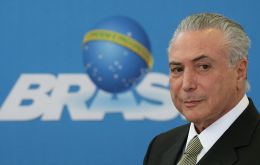
Brazilian President Michel Temer on Thursday unveiled a raft of stimulus measures to reduce the debt burden of businesses and consumers struggling with the country's worst recession on record amid growing popular discontent. Although limited in scope, the measures aim to appease Brazilians angry at the deepening recession in Latin America's biggest economy and allegations of corruption against Temer and his closest allies.
-
Tuesday, December 13th 2016 - 15:42 UTC
Temer preparing stimulus measures to prop the economy and his political future
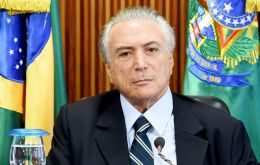
President Michel Temer, fighting for survival over corruption allegations against him and his government, is planning new measures to jump start Brazil's stalled economy, improve his dismal approval ratings and stifle calls for his resignation.
